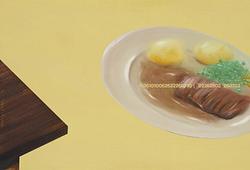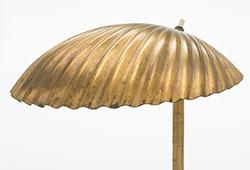Akseli Gallen-Kallela
CAT AND DOG.
Sign. Oil on canvas 59.5x42.5 cm.
More information
Tuija Wahlroos, Director, Gallen-Kallela Museum
Akseli Gallen-Kallela: Cat and dog (1890s)
I have a painting for you, unless you prefer to give it up for sale at Hagelstam’s. It’s a 40 by 65 cm work showing a dumb-looking dog facing a clever cat over a ditch in a snow-covered field. (Letter of Akseli Gallen-Kallela to Ernst Tilgmann, dated 25 March 1897) [1]
I am delighted at the thought of this painting, as I know that even Maestro Gallén can find fascination and amusement in “a dumb dog and a clever cat”. (Letter of Ernst Tilgmann to Akseli Gallen-Kallela, dated 28 March 1897) [2]
The correspondence between Gallen-Kallela and Tilgmann casts light on the circumstances surrounding the creation of the seldom exhibited and little-known painting Cat and Dog. These men mainly shared a professional concern for image printing, and their correspondence tended to focus on the technical nuances of graphic arts and issues arising from artwork printing. Ernst Tilgmann worked at the book printing and photoengraving firm F. Tilgmanns Bok- & Stentryckeri samt kemigrafi that had been founded by his father Ferdinand Tilgmann, and he had spent some time in Germany and Austria learning heliogravure, the most advanced art printing technology of his day. Even though Gallen-Kallela’s renowned heliogravure portfolio did not appear until 1912-1914, the correspondence indicates how techniques for reproducing high quality printed images of artworks were already under consideration in the 1890s, including a discussion of a test impression of the Forging of the Sampo. As Tilgmann then sent some graphical production materials to Gallen-Kallela, it is conceivable that Cat and Dog served as consideration for the assistance thereby rendered to the artist and for other intended collaboration.
A marginal note subsequently made on the letter by Leonard Bäcksbacka in 1931 also alludes to the origins of Cat and Dog, suggesting that Gallen-Kallela had said that it was painted in Korso in 1890. The source of this information is not entirely clear, as the note was made after the artist’s death, and some correspondence dating from 1897 also gives the contrary impression that the work was still unfinished at that time. In any case, it forms an interesting diversion from the artist’s general output in the 1890s. Cat figures are admittedly familiar from his previous works Old Woman With a Cat (1885) and Spruces in a Farmyard (1887), but the facing pose with a hunting dog represents a less common subject depicting only the animals. For example some known works from the 1880s feature a human figure facing an animal such as a cat, a cow, a cock and a crow. Through his own portrayal Gallen-Kallela gives character to the animals in the painting that can serve as the basis for a narrative if desired. The work gives the artist a realist orientation, with the everyday character of the scene emphasised by locating the event in a cloudy and minimally illuminated landscape. The horizon is shallow and the visual area is dominated by a wintry field with grass stalks emerging from under the snow.
Gallen-Kallela painted several winter subjects and landscapes towards the end of the 1890s purely to make a living. After the controversy and outrage caused by his Symposium (originally entitled The Problem, 1894), he found that he had gone “out of fashion” and it was difficult to make ends meet. It was nevertheless at this time that the artist’s best-known works on the Kalevala theme originated and he pursued ground-breaking work in the field of industrial art. He developed a strong interest in the graphic arts and the opportunities that they promised, and his collaboration with Ernst Tilgmann and others testifies to the manner and intensity of the artist’s confidence in his own work and its future.
[1] Copy in the archives of the Gallen-Kallela Museum.
[2] Archives of the Gallen-Kallela Museum.
Artist
Akseli Gallen-Kallela is counted among Finland's most famous artists, born in 1865 in Pori. He studied at the Drawing School of the Finnish Art Society in Helsinki and later at the Académie Julian in Paris. He worked across various art forms such as painting, graphics, illustrations, textiles, architecture, and even designed military uniforms. Akseli Gallen-Kallela's first significant work, 'Old Woman with a Cat,' challenged the ideals of its time and paved the way for realism in Finnish painting.
Gallen-Kallela was primarily known for his paintings and illustrations for the Finnish national epic, 'Kalevala.' In 1900, he executed dome paintings with Kalevala motifs for the Finnish pavilion at the World Exhibition in Paris. His visual language is often described as naturalistic, symbolic, and expressionistic
Read more



































